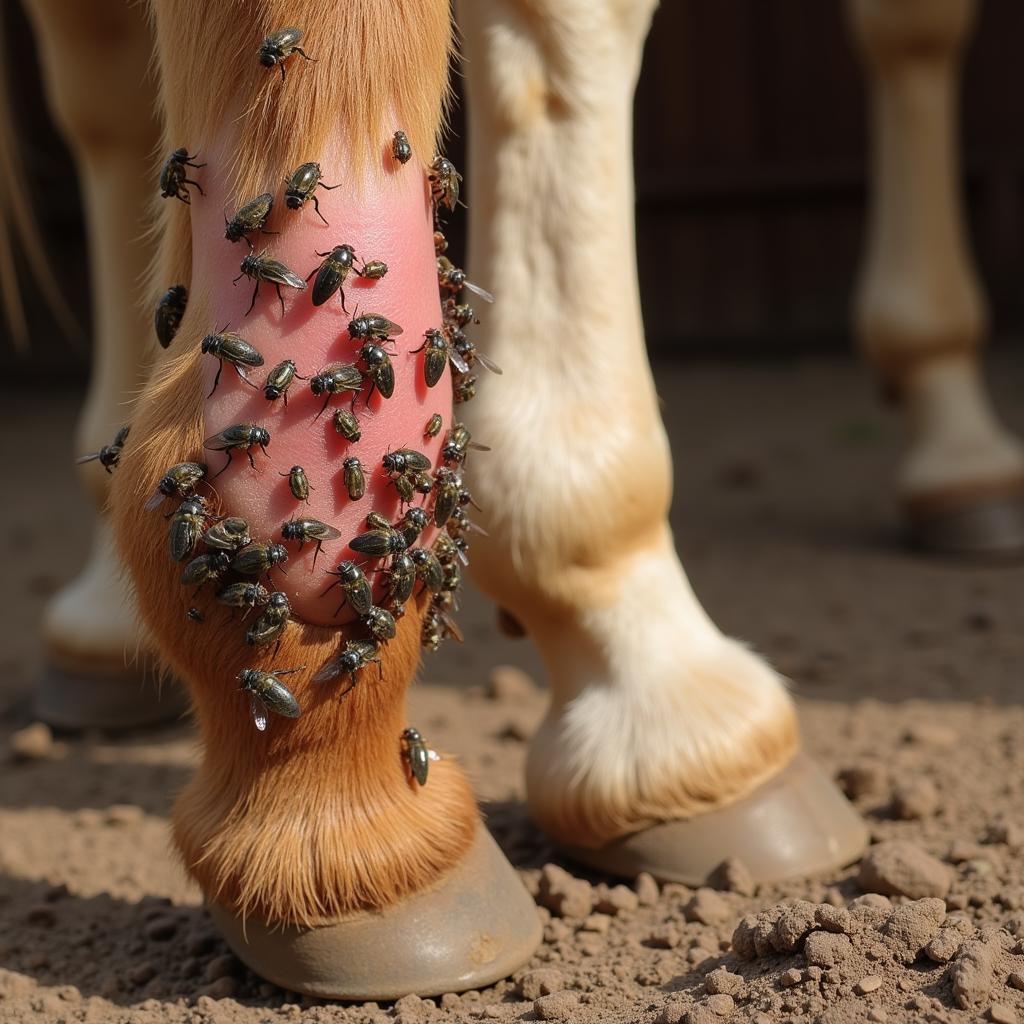Fly Protection For Horses is essential for their comfort and health during warmer months. Flies can be more than just a nuisance; they can transmit diseases, cause infections, and lead to significant stress. This comprehensive guide explores the various methods and strategies for effective fly control, ensuring your equine companions enjoy a fly-free summer.
Understanding the Need for Fly Protection
Horses are particularly susceptible to fly bites and the problems they can cause.  Horse Suffering from Fly Bites Flies can transmit diseases like West Nile virus, Equine Infectious Anemia, and various skin infections. They also cause intense itching and irritation, leading to self-trauma from stomping, rubbing, and tail swishing. Furthermore, constant fly worry can impact a horse’s ability to graze and rest properly, affecting their overall well-being. Therefore, implementing a robust fly control strategy is crucial for responsible horse ownership.
Horse Suffering from Fly Bites Flies can transmit diseases like West Nile virus, Equine Infectious Anemia, and various skin infections. They also cause intense itching and irritation, leading to self-trauma from stomping, rubbing, and tail swishing. Furthermore, constant fly worry can impact a horse’s ability to graze and rest properly, affecting their overall well-being. Therefore, implementing a robust fly control strategy is crucial for responsible horse ownership.
Different Types of Fly Protection for Horses
Various fly control methods cater to different needs and preferences. Some popular options include fly sprays, fly sheets, fly masks, and fly boots. mesh-fly-boots-for-horses are an excellent way to protect your horse’s legs from biting insects. Selecting the right method depends on the individual horse, the environment, and the severity of the fly problem.
Fly Sprays: Your First Line of Defense
Fly sprays are a cornerstone of fly control for horses. They offer immediate relief and come in various formulations, including natural and synthetic options. Look for sprays containing pyrethrins, permethrins, or DEET for effective protection.
Fly Sheets and Masks: Physical Barriers Against Flies
Fly sheets and masks offer excellent physical protection against flies. Fly sheets cover the horse’s body, preventing flies from landing and biting. best-fly-mask-for-horses protect the sensitive areas around the eyes and ears. Choose breathable materials to prevent overheating, especially during hot weather.
Fly Boots and Leg Wraps: Protecting Vulnerable Legs
Horses’ legs are especially prone to fly bites. shoofly-boots-for-horses and leg wraps provide a protective barrier against flies, reducing irritation and the risk of infection.
“Fly boots are indispensable, especially for horses prone to scratches or other leg sensitivities,” says Dr. Emily Carter, DVM, specializing in equine medicine. “They provide a crucial layer of defense against biting insects, promoting faster healing and preventing further complications.”
Environmental Fly Control
Managing the environment is just as important as using direct fly protection methods. Regularly removing manure, maintaining clean stalls, and properly disposing of waste are crucial for minimizing fly breeding grounds.
Manure Management: Key to Fly Control
Manure is the primary breeding ground for flies. Regularly removing manure from pastures and stalls significantly reduces fly populations. Consider composting manure or using a manure management system to further minimize fly breeding.
Stable Hygiene: Creating a Fly-Free Environment
Maintaining a clean and dry stable is essential for fly control. Regularly clean stalls, remove soiled bedding, and ensure proper ventilation to discourage fly activity.
“Maintaining a clean environment is paramount in minimizing fly infestations,” adds Dr. Carter. “Regular manure removal, coupled with proper stable hygiene, creates a less hospitable environment for flies, significantly reducing their numbers.”
Integrated Fly Control Strategies: A Holistic Approach
The most effective fly protection for horses involves a combination of methods. Integrating fly sprays, sheets, masks, boots, and environmental control strategies provides comprehensive protection. spot-on-fly-control-for-horses offers another layer of protection, effectively targeting specific fly species. Tailoring your approach to the individual horse’s needs and the specific fly challenges in your area ensures optimal results. shoofly-leggins-for-horses offer a lightweight alternative to traditional fly boots.
Conclusion: Keeping Your Horses Comfortable and Fly-Free
Effective fly protection for horses is crucial for their well-being. By implementing a comprehensive and integrated fly control strategy, you can protect your equine companions from the nuisance and health risks associated with flies. Remember to choose the methods that best suit your horse’s needs and the environment.
When you need assistance, please contact us:
Phone: 0772127271
Email: [email protected]
Address: QGM2+WX2, Vị Trung, Vị Thuỷ, Hậu Giang, Việt Nam.
We have a 24/7 customer service team.